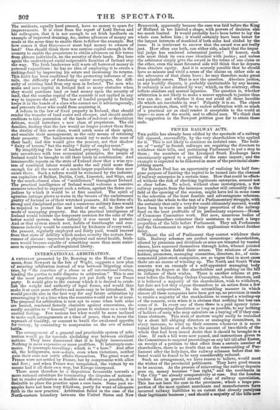INTERNATIONAL ARBITRATION.
A PETITION presented by Dr. Bowring to the House of Com- mons, from Newport in the Isle of Wight, suggests a new plan of securing arbitration instead of war between litigating coun- tries, by " the insertion of a clause in all international treaties, binding the parties to refer disputes to arbitration." This is one of the most practical suggestions yet put forth by our Peace LaT. It would give to the custom which it is desired to estab- itY the weight and authority of legal forms, and would thus make it at once more effective and more easy to be introduced. It would provide also in the best way for any future arbitration by prearranging it at a time when the countries would not be at issue. The proposal for arbitration is now apt to come when both sides are heated, rendered fiercely, obstinate against concessions, ab- surdly sensitive to " honour, and prone to violence as a vent for excited feeling. Few nations but what would be more inclined to make such arrangements at a time of peace, than to incur the reproach of timidity, or consent to baulk the awakened appetite for victory, by consenting to compromise on the eve of actual battle.
The arrangement of a general and practicable system of arbi- tration would go far towards abolishing war between civilized nations. They have discovered that it is highly inconvenient. Nothing is more expensive or more profitless. It interrupts com- merce. It interrupts travelling; which is " a bore." And after all, the belligerents, now-a-days, even when victorious, neither ggaain their ends nor settle affairs themselves. The great wars of "France were not settled by France, but by compromise with allies and foes ; and when France was vanquished, the victors by no means had it all their own way, but Europe interposed.
There must therefore be a disposition favourable towards a more rational substitute for terminating the disputes of nations : but to render arbitration as feasible and effective as possible, it is desirable to place the practice upon a sure basis. Some past ex- amples have not been very felicitous, partly for want of adequate faith in the new practice. Arbitration failed in the case of the North-eastern boundary between the United States and New Brunswick, apparently because the case was laid before the King of Holland in too limited a shape, with powers of decision also too much limited. It would probably have beerebetter to lay the whole case before him ; it would certainly have been better for the largest interests of mankind if both sides had abided by the issue. It is irrelevant to answer that the award was not really just. How often can both, can either side, admit that the impar tial judge has rendered substantial justice ? If honest, each side must think its own case identical with justice ; and unless the arbitrator simply give the award in the terms of one claim or the other, even the most favoured side will think that he departs from absolute equity. And it is scarcely possible that he should have so minute and vivid a sense of the claims on either side as the advocates of that claim have : he may therefore make great and palpable errors. That is not the question. Absolute justice, in any worldly dispute, is probably unattainable by any means. It certainly is not attained by war; which, on the contrary, often inflicts absolute and mutual injustice. The question is, whether arbitration is not likely to make a nearer approach to justice than war can do; and whether it does not avoid all those horrible ills which are inevitable in war ? Palpably it is so. The object of peace-makers, then, will be to endow arbitration with so much of a practical air as shall render it acceptable to the world at large—to men of the world, and to official men. We think that the suggestion in the Newport petition goes far to attain those ends.


























 Previous page
Previous page